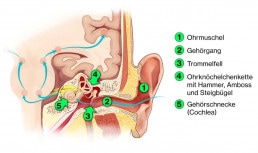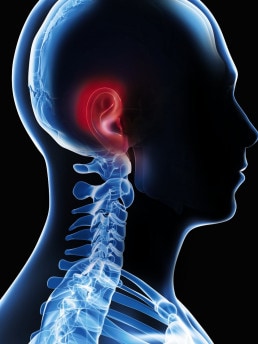A survey carried out in 2012 shows that about half of Germany’s population is disturbed by traffic noise. Add other sources of noise into the mix such as industrial operations, aircraft, or the lawnmower down the street, and it’s soon clear that noise is a problem everywhere – one that affects society as a whole. This led America’s Center for Hearing and Communication (CHC) to declare 29 April International Noise Awareness Day, which is also observed in Germany under the auspices of the German Acoustical Society (DEGA). What better opportunity for us to take a little closer look at the subject of “noise”?
What exactly is noise?
Noise is sound that is perceived as disturbing and annoying, or sound that damages your hearing. So even soft sounds can affect your comfort levels. When sound enters the auricle (1) and then passes through the auditory canal (2), eardrum (3) and the auditory ossicles (4) to the fluid in the cochlea (5), the movements in the fluid are perceived there by hair cells. This is what allows us to distinguish different frequencies. And this in turn is how we are able to understand language and differentiate precisely between words such as “dream”, “cream” or “beam”. This whole structure is extremely sensitive and noise can irreparably damage it.

How does noise physically affect us?
Hair cells become damaged over time, through either age or – much more likely – through noise. The more work the hair cells have to do, the earlier they will break. And so people who are regularly exposed to noise will suffer wear and tear to these cells sooner than those whose environment is normally quieter. Otherwise it’s simply a question of time, and once a hair cell is broken it will not regenerate.
So what are the consequences?
Hearing loss begins when hair cells die off. The process is gradual and there are no signs to start with. As hearing loss progresses, the higher tones are usually the first to be affected. This makes it harder and harder to make out words and phrases against a noisy background. You need to concentrate harder to be able to follow every sentence when talking with others, which tires you out faster and makes you less inclined to participate in conversations.
Your social life as a whole can sometimes be affected as a result. You think, “Why should I bother going out to see people if I can hardly make out what they’re saying?” or “Is everyone speaking more softly or is it just my hearing?” or even “They’re always whispering – are they talking about me again?”
People with hearing loss are in immediate danger when they cannot make out warning signals properly, for instance. But we also shouldn’t underestimate the many small hindrances that add up to quite substantial restrictions for the hard of hearing.
Does noise always lead to hearing loss?
While noise does not always result in hearing loss, it still has noticeable effects on you as a human being, especially in a work environment. It can cause issues such as:
- Loss of concentration
- Tension
- Discomfort
- Gastrointestinal complaints
- High blood pressure

What can I do about noise at work?

In a private setting it can be relatively easy to move away from a source of noise, but at work that’s generally not an option. But when you consider that employees – and their health – are the most important resource that a business has, you should never underestimate the possible far-reaching consequences of a noisy workplace.
Even at 85 decibels, noise experienced for 40 hours a week can damage your hearing. In such environments, employees are required to wear hearing protection under the German Occupational Health and Safety Ordinance on Noise and Vibration (“LärmVibrationsArbSchV”).
Here at uvex we treat noise as a challenge, and can provide the best possible protection for almost every kind of noise, from various types of earplugs and earmuffs to made-to-measure ear moulds. We will be happy to respond to any questions you may have on this subject – just use the comment fields or get in touch using our contact form.